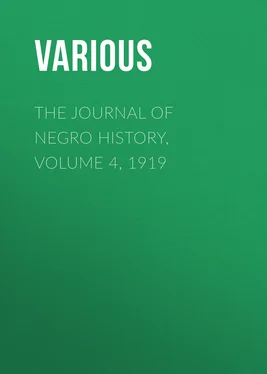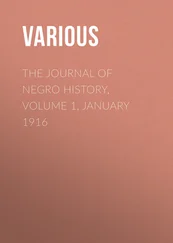Various - The Journal of Negro History, Volume 4, 1919
Здесь есть возможность читать онлайн «Various - The Journal of Negro History, Volume 4, 1919» — ознакомительный отрывок электронной книги совершенно бесплатно, а после прочтения отрывка купить полную версию. В некоторых случаях можно слушать аудио, скачать через торрент в формате fb2 и присутствует краткое содержание. Жанр: foreign_antique, periodic, История, foreign_edu, на английском языке. Описание произведения, (предисловие) а так же отзывы посетителей доступны на портале библиотеки ЛибКат.
- Название:The Journal of Negro History, Volume 4, 1919
- Автор:
- Жанр:
- Год:неизвестен
- ISBN:нет данных
- Рейтинг книги:5 / 5. Голосов: 1
-
Избранное:Добавить в избранное
- Отзывы:
-
Ваша оценка:
- 100
- 1
- 2
- 3
- 4
- 5
The Journal of Negro History, Volume 4, 1919: краткое содержание, описание и аннотация
Предлагаем к чтению аннотацию, описание, краткое содержание или предисловие (зависит от того, что написал сам автор книги «The Journal of Negro History, Volume 4, 1919»). Если вы не нашли необходимую информацию о книге — напишите в комментариях, мы постараемся отыскать её.
The Journal of Negro History, Volume 4, 1919 — читать онлайн ознакомительный отрывок
Ниже представлен текст книги, разбитый по страницам. Система сохранения места последней прочитанной страницы, позволяет с удобством читать онлайн бесплатно книгу «The Journal of Negro History, Volume 4, 1919», без необходимости каждый раз заново искать на чём Вы остановились. Поставьте закладку, и сможете в любой момент перейти на страницу, на которой закончили чтение.
Интервал:
Закладка:
By reference to this evidence, part 3, page 136, it will be seen that the emigration movement in Alabama originated as far back as the year 1871, when an organization of colored people, called the State Labor Union, delegated Hon. George F. Marlow to visit Kansas, and other parts of the West, for the purpose of examining that country and reporting back to a future convention his views as to the expediency of removing thereto. A convention of colored people was held again in 1872, at which Mr. Marlow made the following glowing report of the condition of things in Kansas and the inducements that State offered to the colored people. He said:
In August, 1871, being delegated by your president for the purpose, I visited the State of Kansas, and here give the results of my observations, briefly stated.
It is a new State, and as such possesses many advantages over the old.
It is much more productive than most other States.
What is raised yields more profit than elsewhere, as it is raised at less expense.
The weather and roads enable you to do more work here than elsewhere.
The climate is mild and pleasant.
Winters short and require little food for stock.
Fine grazing country; stock can be grazed all winter.
The population is enterprising, towns and villages spring up rapidly and great profits arise from all investments.
Climate dry, and land free from swamps.
The money paid to doctors in less healthy regions can here be used to build up a house.
People quiet and orderly, schools and churches to be found in every neighborhood, and ample provision for free schools is made by the State.
Money, plenty, and what you raise commands a good price.
Fruits of all kinds easily grown and sold at large profits.
Railroads are being built in every direction.
The country is well watered.
Salt and coal are plentiful.
It is within the reach of every man, no matter how poor, to have a home in Kansas. The best lands are to be had at from $2 to $10 an acre, on time . The different railroads own large tracts of land, and offer liberal inducements to emigrants. You can get good land in some places for $1.25 an acre. The country is mostly open prairie, and level, with deep, rich soil, producing from forty to one hundred bushels of corn and wheat to the acre. The corn grows about eight or nine feet high, and I never saw better fruit anywhere than there.
The report was adopted.
The feeling of the colored people in that State in 1872 was well expressed by Hon. Robert H. Knox, of Montgomery, a prominent colored citizen, who, in addressing the convention, spoke as follows:
I have listened with great attention to the report of the commissioner appointed by authority of the State Labor Union to visit Kansas, and while I own the inducements held out to the laboring man in that far-off State are much greater than those enjoyed by our State, I yet would say let us rest here awhile longer; let us trust in God, the President, and Congress to give us what is most needed here, personal security to the laboring masses, the suppression of violence, disorder, and kukluxism, the protection which the Constitution and laws of the United States guarantee, and to which as citizens and men we are entitled. Failing in these, it is time then, I repeat, to desert the State and seek homes elsewhere where there may be the fruition of hopes inaugurated when by the hand of Providence the shackles were stricken from the limbs of four million men, where there may be enjoyed in peace and happiness by your own fireside the earnings of your daily toil.
Benjamin Singleton, an aged colored man, now residing in Kansas, swears that he began the work inducing his race to migrate to that State as early as 1869, and that he has brought mainly from Tennessee, and located in two colonies—one in Cherokee County, and another in Lyons County, Kansas—a total of 7,432 colored people. The old man spoke in the most touching manner of the sufferings and wrongs of his people in the South, and in the most glowing terms of their condition in their new homes; and when asked as to who originated the movement, he proudly asserted, "I am the father of the exodus." He said that during these years since he began the movement he has paid from his own pocket over $600 for circulars, which he has caused to be printed and circulated all over the Southern States, advising all who can pay their way to come to Kansas. In these circulars he advised the colored people of the advantages of living in a free State, and told them how well the emigrants whom he had taken there were getting on. He says that the emigrants whom he has taken to Kansas are happy and doing well. The old man insists with great enthusiasm that he is the "Whole cause of the Kansas immigration," and is very proud of his achievement.
Here, then, we have conclusive proof from the Negroes themselves that they have been preparing for this movement for many years. Organizations to this end have existed in many States, and the agents of such organizations have traveled throughout the South. One of these organizations alone kept one hundred and fifty men in the field for years, traveling among their brethren and secretly discussing this among other means of relief. As stated by Adams and Perry, politicians were excluded, and the movement was confined wholly to the working classes.
The movement has doubtless been somewhat stimulated by circulars from railroad companies and State emigration societies which have found their way into the South, but these have had comparatively little effect. The following specimen of these emigration documents, which was gotten up and circulated by Indiana Democrats, printed at a Democratic printing office, and written by a Democrat, in our judgment appeals more strongly to the imagination and wants of the Negro than any we have been able to find:
In every county of the State there is an asylum where those who are unable to work and have no means of support are cared for at the public expense.
Laborers who work by the month or by the year make their own contract with the employer, and all disputes subsequently arising are settled by legal processes in the proper courts, everybody being equal before the law in Indiana . The price of farm labor has varied considerably in the last twenty years. About $16 per month may be assumed as about the average per month, and this is understood to include board and lodging at the farm-house. This amount is paid in current money at the end of each month , unless otherwise stipulated in the contract. Occasionally a tenement house is found on the larger farms, where a laborer lives with his family, and either rents a portion of the farm or cultivates it on special contract with the landlord. With us there is no class of laborers as such. The young man who today may be hired as a laborer at monthly wages, may in five years from now be himself a proprietor, owning the soil he cultivates and paying wages to laborers. The upward road is open to all , and its highest elevation is attainable by industry, economy, and perseverance.
Sixteen dollars per month, with board! Everybody equal before the law! No class of laborers as such! The hired man of today himself the owner of a farm in five years! No cheating of tenants, but everything paid in current money. And if all this will not attract the Negro he is told there is an "asylum in every county" to which he can go when unable to support himself. The document also promises to everybody "free schools" in "brick or stone school-houses," and says they have "2,000,000 greater school fund than any State in the Union." These Democratic documents have been circulated by the thousand, and doubtless many of them have found their way into the Negro cabins of North Carolina. It is not surprising that the Negro looks with longing eyes to that great and noble State.
Читать дальшеИнтервал:
Закладка:
Похожие книги на «The Journal of Negro History, Volume 4, 1919»
Представляем Вашему вниманию похожие книги на «The Journal of Negro History, Volume 4, 1919» списком для выбора. Мы отобрали схожую по названию и смыслу литературу в надежде предоставить читателям больше вариантов отыскать новые, интересные, ещё непрочитанные произведения.
Обсуждение, отзывы о книге «The Journal of Negro History, Volume 4, 1919» и просто собственные мнения читателей. Оставьте ваши комментарии, напишите, что Вы думаете о произведении, его смысле или главных героях. Укажите что конкретно понравилось, а что нет, и почему Вы так считаете.












